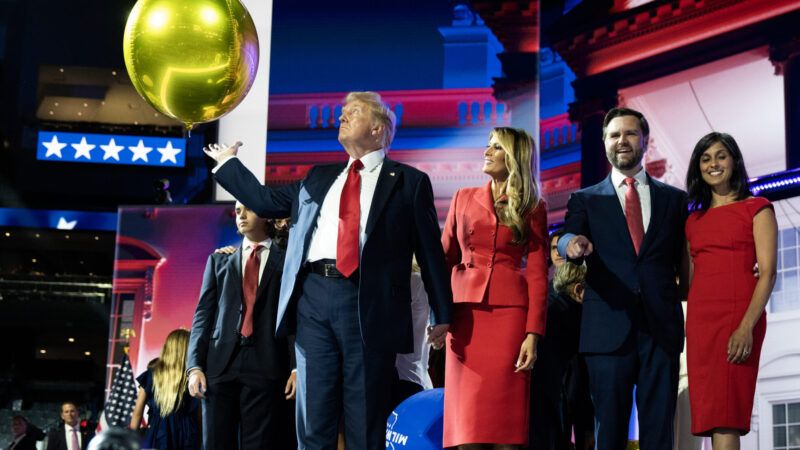Republicans Don't Even Pretend To Want To Cut Government Anymore
This week left no doubt that the GOP's current leadership wants the government to do more, spend more, and meddle more.

Presidential nominee Donald Trump delivered the longest acceptance speech in recent history on Thursday night at the Republican National Convention (RNC).
But nowhere in that 90-minute address did Trump find time to call for eliminating or abolishing a single, specific government program. He talked about raising tariffs and cutting taxes, aired grievances and attacked immigrants, but gave no thought to shrinking the size or scope of government. If Trump wanted to convince libertarians to vote for him—something he has explicitly tried to do during this campaign—then Thursday night's speech was probably not the best way to go about it.
In fairness, convention speeches by presidential nominees are not often the venue for long and detailed discussions of cutting government. Nights like Thursday are always more about what the government can do for you, not what you could do without the government.
Still, Republicans used to at least nod toward their small government credentials. In 2012, Mitt Romney used his acceptance speech to vow a repeal of Obamacare. In 2016, Trump spoke at some length about the need to roll back regulations, which he called "one of the greatest job-killers of all," specifically pointing out rules that hindered energy production.
Even if it's wrong to expect much specificity from the presidential nominees at the convention, the lack of talk about shrinking government extended to the rest of the RNC too.
Vivek Ramaswamy, easily the boldest voice for slashing government during the Republican primaries this year, spoke at the convention on Tuesday night. He gave a fine speech about the importance of America's founding virtues. He did not, however, encourage the Republican Party to embrace any particular cuts.
The same is true for the guys who are tasked with running Republican congressional campaigns this year. Sen. Steve Daines (R–Mont.) and Rep. Richard Hudson (R–N.C.), the respective chairmen of the National Republican Senatorial Committee and National Republican Congressional Committee, spoke in the early part of Thursday's programming about the importance of GOP majorities in Congress.
Hudson offered a particularly tidy rundown of what that future congressional majority might aim to do. "A Republican House and President Donald Trump will preserve the historic Trump tax cuts and eliminate taxes on tips," he promised. "Together, a Republican House and President Donald Trump will fund the police. We will rebuild our military. We will stand up to Communist China. Ladies and gentlemen, we will finish the wall."
Republicans have drifted so far away from talking about cutting government that Hudson didn't even bother to rattle off the usual blather about excising waste, fraud, and abuse—of which there is, as always, plenty.
Sen. J.D. Vance (R–Ohio), Trump's newly picked running mate, is supposed to be the intellectual policy wonk on the ticket. But he didn't use his speech on Wednesday night to call for shrinking the government. Quite the opposite, in fact. Vance is one of the leading voices for what might be called progressive conservatism, and he sees a need for government to do more, not less. He's called for Republicans to seize the power of the administrative state, rather than trying to curtail it.
Yes, I'm grumpy about all this because, as a libertarian, I'm biased. I want politicians to talk about cutting government—and then to follow through.
But that's not the only reason. When measured as a share of the U.S. economy, the federal government is now larger than it has ever been outside of crises like World War II and the COVID-19 pandemic. Last year, federal spending totaled 22.7 percent of gross domestic product (GDP). Taxes cannot keep pace, and thus the deficits are exploding in the short and long term. This is an obvious problem, and bringing government spending back into line with historical norms—around 20 percent of GDP—would not be a radical idea, but a necessary one.
And if Republicans aren't going to be the ones to start that conversation, who will? Unfortunately, this week left no doubt that the GOP's current leadership wants the government to do more, spend more, and meddle more.


Show Comments (104)